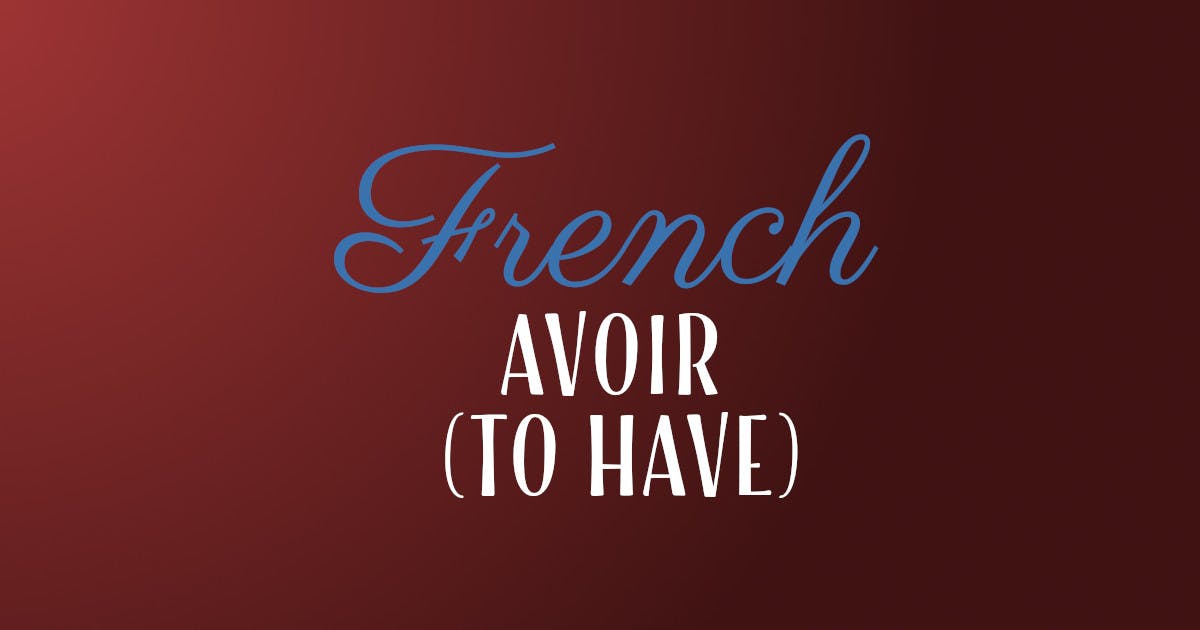The Verb 'avoir' (To Have) In French
The verb avoir means to 'to have' in French. Here you'll learn how to conjugate it in the different tenses.
Avoir is the French equivalent of “to have” and it's just as important in French as it is in English.
Besides being a verb, it is one of 2 helper verbs (the other being être).
The majority of compound tenses are built with avoir.
Once you’ve mastered avoir and être and the participe passé of the verbs to be conjugated, you’ve mastered the compound tenses.
The compound tenses of avoir use the simple tenses of avoir as auxiliaries.
Indicatif
| Présent | Imparfait | Passé Simple | Futur Simple | |
|---|---|---|---|---|
| j’ tu il, elle, on nous vous ils, elles | ai as a avons avez ont | avais avais avait avions aviez avaient | eus eus eut eûmes eûtes eurent | aurai auras aura aurons aurez auront |
Compound tenses
| Passé Composé | Plus que Parfait | Passé Antérieur | Futur Antérieur | |
|---|---|---|---|---|
| j’ tu il, elle, on nous vous ils, elles | ai eu as eu a eu avons eu avez eu ont eu | avais eu avais eu avait eu avions eu aviez eu avaient eu | eus eu eus eu eut eu eûmes eu eûtes eu eurent eu | aurai eu auras eu aura eu aurons eu aurez eu auront eu |
Subjunctive
| Présent | Imparfait | Passé | Plus que Parfait | |
|---|---|---|---|---|
| que j’ que tu qu’il, elle, on que nous que vous qu’ils, elles | aie aies ait ayons ayez aient | eusse eusses eût eussions eussiez eussent | aie eu aies eu ait eu ayons eu ayez eu aient eu | eusse eu eusses eu eût eu eussions eu eussiez eu eussent eu |
Conditionnel
| Présent | Passé | Passé 2nd form | |
|---|---|---|---|
| j’ tu il, elle, on nous vous ils, elles | aurais aurais aurait aurions auriez auraient | aurais eu aurais eu aurait eu aurions eu auriez eu auraient eu | eusse eu eusses eu eût eu eussions eu eussiez eu eussent eu |
Impératif
| Présent | Passé | |
|---|---|---|
| (tu) (nous) (vous) | aie ! ayons ! ayez ! | aie eu ! – ayons eu ! ayez eu ! |
- infinitif: avoir
- participe présent: ayant
- participe passé: eu
Sample sentences using avoir
Présent:
J’ai un chat.
Imparfait:
Elle avait une maison.
Passé simple:
Nous eûmes du succès.
Futur Simple:
Ils auront des victoires.
Passé Composé:
J’ai eu un appel.
Plus que Parfait:
Tu avais eu du dessert.
Passé Antérieur:
Elle eut eu son divorce.
Futur Antérieur:
Vous aurez eu raison.
Présent du Subjonctif:
Je ne pense pas que vous ayez un choix.
Imparfait du Subjonctif:
Il y avait trop de preuves pour que nous eussions trop de doutes.
Passé du Subjonctif:
Il faut qu’ils aient eu peur pour partir si vite.
Plus que Parfait du Subjonctif:
Il ne doutait pas que son interlocuteur eût eu du succès dans le passé.
Conditionnel:
Si j’avais mangé ce matin, je n’aurais pas faim.
Impératif:
Aie pitié!
Infinitif:
Avoir foi.
Participe présent:
Ayant trop de problèmes, le candidat se retira de la campagne.
Participe passé:
Nous avons eu un voyage sans problèmes.

SUBSCRIBE: